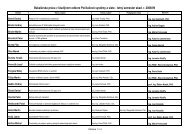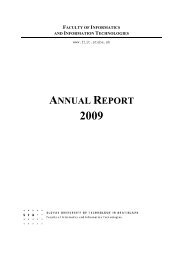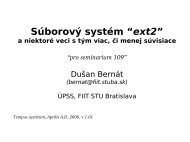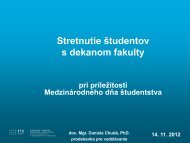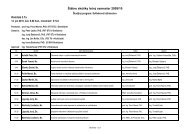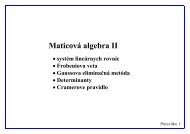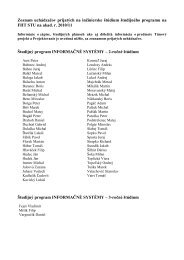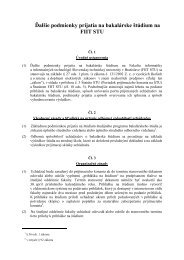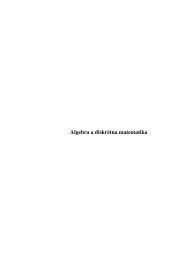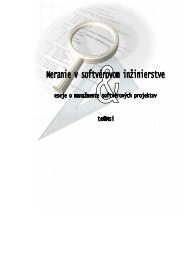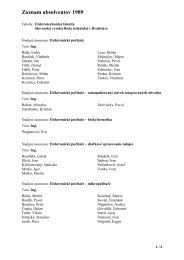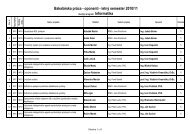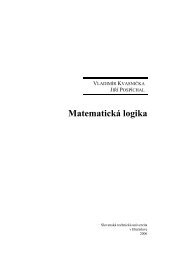elektronická verzia publikácie - FIIT STU
elektronická verzia publikácie - FIIT STU
elektronická verzia publikácie - FIIT STU
Create successful ePaper yourself
Turn your PDF publications into a flip-book with our unique Google optimized e-Paper software.
66 <strong>STU</strong> Faculty of Informatics and Information TechnologiesDoctoral (PhD.) ThesesStudent name: Roland DobaiDegree program: Applied InformaticsThesis title: Test Generation for Asynchronous Sequential Digital CircuitsSupervisor: Elena Gramatová, Associate ProfessorDefended on: January 19, 2011Annotation: The dissertation thesis is aimed at test generation for asynchronoussequential digital circuits, contributes to their time- and cost-effectivetesting, and indirectly supports their wider application, which improvesthe performance, the power consumption and the electromagneticemission of future digital circuits. The main scientificcontribution is design of the new test generator (optimized for testlength and area overhead) for wide spectrum of asynchronous sequentialdigital circuits. The contributions are identification of unacceptablesignal transitions before test generation, reduced number ofgenerated test patterns for combinational representation, effective statejustification on the gate level, fast (optimized for test length) sequentialfault propagation to outputs and effective fault simulation. Experimentalresults confirmed the generation of optimal tests with goodfault coverage and without application of any method for increasingthe testability. The developed methods can be used with wider spectrumof circuits than other recently developed test generators, and atthe same time their effectiveness ensures fast test generation.Student name: Attila ŠtrbaDegree program: Applied InformaticsThesis title: Wireless Embedded Systems Powered by EnergyHarvestingSupervisor: Tibor Krajčovič, Associate ProfessorDefended on: November 23, 2011Annotation: Ambient intelligence requires that devices integrated to the environmentare self-sustaining and maintenance free. To fulfill the vision ofambient intelligence, the design of small wireless embedded systemspowered by energy harvesting is needed. Our work raises awarenessthat generic embedded system and wireless sensor nodes are differentfrom wireless embedded systems powered by energy harvesting(WESPEH) therefore a different design approach is required. Thework introduces a new design technique based on rapid prototypingand constraints analysis. From different groups of constraints thesoftware problematic is developed in detail further with the focus onoperating system design. We define the requirements, architecture anddesign aspects of energy autonomous operating systems. Based onthese definitions a new operating system DolphinAPI is designed andimplemented initially on EO3000I hardware platform. A new operatingsystem quantification method - considering energy consumption,footprint size and scheduler behavior - is introduced as well and usedto evaluate and compare TinyOS and Dolphin API. The method isbased on vector definition and trace-driven performance analysis.



